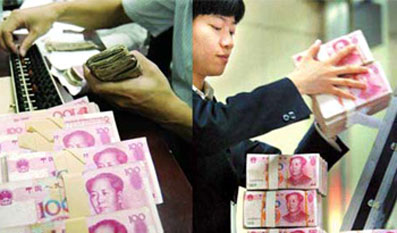(单词翻译:单击)
In most countries the stock market and the economy move up and down together in a happy union, but in China they have often been distant relatives. That split is widening like never before, with the economy continuing to slow but the stock market taking off, all of which hints at deep dysfunction in the financial system.
在大多数国家,股市和经济是同涨同跌的天作之合,但在中国,它们往往是相距遥远的亲戚。如今这种背离达到了前所未有的程度——经济增长持续放缓,但股市却在高歌猛进,所有这些表明中国金融体系出现了严重失灵。

Just three months ago the main Chinese stock market was dormant. Since then it has surged 30 per cent and has started to show signs of the manic trading that normally does not appear until a bull market has been gathering steam for years. On some days this month, the trading volumes on the stock exchanges in China have exceeded those of all the others in the world combined. Prices are swinging wildly, with some of them gaining 10 per cent then losing it all and more within minutes — often in the absence of any news about the company or the economy. Showing classic symptoms of a mania, Chinese investors are borrowing heavily to buy stocks and flipping them quickly. On average, they are holding them for barely two weeks, compared with four months in the US.
仅仅在3个月前,中国主要股市还处于蛰伏状态,但自那以后大幅飙升30%,并开始呈现出疯狂交易的迹象,而这种迹象通常在多年牛市蓄势以后才会出现。本月有那么几天,中国股市成交量超过世界其他国家股市全部成交量的总和。价格剧烈波动,有些股票在短短几分钟里先是上涨10%,随后又回吐全部涨幅,甚至还转为下跌——而且通常是在没有关于该公司或中国经济的任何消息的情况下。中国投资者正大举借债购买股票并迅速卖出,显示出典型的狂热症状。平均而言,他们持股只有短短的两周时间,而美国投资者的平均持股时间是4个月。
This is just the latest frenzy to hit China and its origins date back to 2008. After the global financial crisis hit, Beijing tried to sustain its growth rate by pouring record amounts of money into the economy. Since late 2008, China’s money supply has expanded from $7tn to $20tn, an increase larger than those seen in all other nations put together. There is now more money circulating in the country than in the far larger economy of the US. Yet all this easy money is, on one hand, failing to prevent the economic slowdown while, on the other, fuelling the stock market and widening the disconnect between the two.
这只是中国股市出现的最新狂热迹象,最初的狂热可以追溯至2008年。在全球金融危机爆发之后,中国试图通过向经济注入创纪录的资金来维持其增长率。自2008年末以来,中国货币供应量从7万亿美元扩大至20万亿美元,增量比其他所有国家新增货币的总和还要多。现在中国流通中的货币甚至多于经济规模远比它大的美国。然而,一方面,所有这些宽松货币未能阻止经济下滑,同时另一方面,它刺激了股市上涨,并让两者更加脱节。
If China continues to feed these frenzies through its monetary policy, the risk will grow that popping asset bubbles will further slow the economy that has been the single largest contributor to global growth this decade. And, if China’s flagging growth rate slowed by another 2 per cent, that would be enough to slow global growth from the current pace of 2.5 per cent to less than 2 per cent, the level widely considered a worldwide recession.
如果中国继续通过其货币政策助长这些狂热,不断吹大的资产泡沫将很有可能让经济进一步放缓——中国经济增长一直是这十年全球增长的单一最大贡献者。此外,如果中国本已逐渐下降的增长率再降低2个百分点,将足以让全球经济增速从当前的2.5%降至2%以下——人们普遍认为,2%以下表明全球陷入了衰退。
The increase in China’s money supply has already sparked a five-year credit binge, the biggest that any big emerging economy has experienced since the end of the second world war. The first asset class to inflate was property, with land prices rising 500 per cent in the decade to 2012. Then, when the authorities moved to cool property prices by limiting purchase of second homes, funds started flowing into complicated investment products offered by a motley assortment of non-bank institutions that make up China’s extensive and informal “shadow banking” sector. At one point, the money started to boost business in the casinos of Macau — until a crackdown ended that flow, too.
中国货币供应增加已经引发了5年的信贷狂欢,这是自二战结束以来所有大型新兴经济体经历的最大规模的信贷狂欢。第一个飙升的资产类别是房地产——在截至2012年的十年里土地价格上涨了500%。随后当有关当局开始通过限制二套房购买来给房价降温的时候,资金开始流入形形色色的非银行机构提供的复杂投资产品——这些非银行机构组成了中国庞大而非正式的“影子银行业”。中国的资金还一度推动了澳门赌场的业务,直至反腐运动把这股资金流也截断了。
By this point the authorities appeared to be playing that old arcade game, Whac-a-Mole. Every time they tried to flatten one emerging asset bubble, another would pop up somewhere else, suggesting that authorities were losing control of the game.
到这时,中国当局似乎在玩那个古老的街机游戏——打地鼠。每次他们试图抹平新出现的资产泡沫时,另一个泡沫就在其他地方出现,这表明中国当局丧失了对游戏的控制。
Only a few months ago, the government was trying to encourage the stock market rally on the basis that this would help the slumping economy. The state media agency, Xinhua, was running stories about how stocks were a good buy. After trading reached frenzied highs, however, Xinhua changed course. Last week it started publishing editorials about how the stock market cannot rely on leverage to create miracles.
就在几个月前,中国政府还试图鼓励股市上涨,认为这将有利于提振低迷的经济。中国官方媒体新华社刊文指出股市如何是很好的投资对象。然而,在股市交易达到疯狂的高点后,新华社改变了立场。上周,它开始发表社论,指出股市不可能依靠杠杆创造奇迹。
This is true — but the state cannot continue relying on easy money to keep an economic miracle alive either. The officially reported growth rate of 7 per cent looks increasingly implausible when checked against a variety of data — both official and independent — from different sectors of the economy. Car sales and electricity consumption are growing at less than half that rate, steel production and oil demand are growing at nearly zero per cent, while property sales are on track to fall 10 per cent this year.
这话说得没错,但政府也不能持续依赖宽松货币保持经济奇迹。将官方公布的7%经济增速与一系列不同经济部门发布的数据(无论是官方还是独立数据)相核对,就会发现前者日益不可信。汽车销售和电力消费增长不足3.5%,钢铁生产和石油需求几乎是零增长,同时今年的房地产销售有可能下降10%。
With the easy money increasingly going to fuel asset bubbles rather than to promote economic growth, China needs to abandon its unsustainable growth target. The world cannot afford a financial accident in China at a time when the global economy is already on the edge.
随着宽松货币日益引发资产泡沫而不是促进经济增长,中国有必要抛弃其不可持续的增长目标。在全球经济已经岌岌可危之际,世界承受不起中国发生金融意外。


